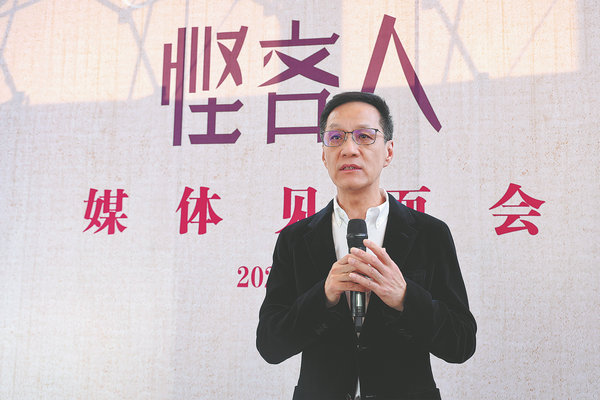

When the Beijing People's Art Theatre's director Lin Cong was trying to make a Chinese stage adaptation of The Miser, a five-act comedy by Moliere — the greatest of French comedy writers — she decided to find out what the actor and playwright had experienced before writing his classic play.
"I did some research about Moliere because I am interested in his life stories, which were connected to his work and the result was very surprising and inspiring," Lin says.
The Miser was first performed in Paris on Sept 9, 1668, 10 years after Moliere returned to the city where he first made his path to fame with royal support.
Before that, from the end of 1645, Moliere had embarked on a 13-year journey, during which he and his theater company traveled through various regions outside the major cities of France.
Throughout that period, their performances encompassed a wide range of dramatic genres, including comedy, tragedy, and farce. The experience allowed Moliere to refine his skills and connect with a wide range of audiences in provincial areas.
"I wondered what he went through during that 13-year journey of touring. I also wanted to know how he dealt with the feedback from the audiences. He started his career by acting in tragedies and he loved tragedies. However, it was his comedies that made him famous. I was curious what he had to say about that," says Lin.
From April 19 to May 12, the latest Chinese adaptation of The Miser by the Beijing People's Art Theatre will premiere at the Cao Yu Theater, one of the venues of Beijing International Theater Center.

Codirected by Lin and Yang Jiayin, it stars young performers of the Beijing People's Art Theatre, as well as veteran performers, including Fu Jia in the lead role of the miser, Harpagon.
"The story will be told by a theater company, which tours just like Moliere and his theater company did. One day, they plan to perform The Miser, but lots of things go wrong and unplanned situations happen during the performance, such as actors forgetting their lines and loud boos from the audience," says Lin. "Despite all the 'messes', the show must go on."
According to Yang, the codirector, the core plot of The Miser remains the same as the classic, and concerns the conflict between love and money. Harpagon wishes his daughter Elise to marry a wealthy old man, Anselme, who will accept her without a dowry, but she loves the penniless Valere. Harpagon himself has set his eye on young, impoverished Mariane, whom his son, Cleante, also loves.
"The story is timeless. Like many great comedies in the world, it makes people laugh but also makes people think," says Yang. "We try to bring the greed to life, immersing the audience in a web of hilarity and satire."
Lin adds that, "if Moliere were still alive now, I would want to know how he would react after learning that The Miser is still performed, and the conflict portrayed in his classic is still true today".
"Usually it's our goal to interpret the roles by doing our best, from the way we look on the outside, to the way we feel on the inside. But the latest adaptation is so different and frankly, it's causing me headaches," says Fu, who laughs and jokes when asked about the rehearsals so far. "We all try to act with bad acting skills and we 'forget' lines on purpose. However, our mistakes have to be natural and real, which is difficult."
"Comedy is very hard and the art of comedic timing is very important, which means the use of pauses, cadence, delivery, and pacing to land a joke," says Lin. "During our rehearsals, we try to offer our actors and actresses a very relaxing environment, which is key to their acting and to their own development of finding the proper comedic timing."

The idea of adapting The Miser again came from an activity launched by the Beijing People's Art Theatre last April, which had young performers of the theater company read the script in front of theater and online audiences. This has been used as a way to train young performers of the theater company, according to Feng Yuanzheng, a veteran actor and president of the Beijing People's Art Theatre.
Feng also says that the theater first adapted the play in 1959, 10 years after the founding of the People's Republic of China. During the 1980s, the company made another adaptation.
"This latest adaptation of The Miser is to mark the 60th anniversary of the establishment of Sino-French diplomatic relations," Feng notes. "Theater is a powerful tool for cultural exchange because it allows people to experience and understand different cultures in a visceral way. The Beijing People's Art Theatre has a long-standing tradition of presenting theatrical productions adapted from foreign literature. By doing so, we, along with the audiences, can see and feel the emotions and stories of people from different backgrounds."